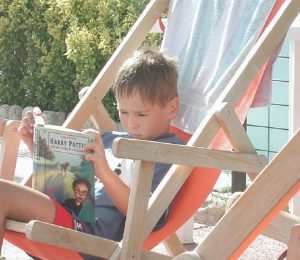At the beginning of every June my students start their countdown to summer vacation. Soccer and baseball games, swimming lessons, family trips, overnight and day camps, and a host of other exciting activities make up the memories of childhood. Yet, with summer vacation comes the dreaded possibility of “summer slide” – the loss of skills and knowledge that students experience over the summer holidays.
Here are some ways parents can help prevent (or at least limit) “SUMMER SLIDE!”
Hiding the Broccoli under the Cheese:
Research from Duke University informs us that the summer break can have a negative impact on learning – particularly in reading and mathematics. However, parents can mitigate the loss of learning that takes place during summer vacation by creating rich learning experiences for their children; experiences that keep their essential reading and mathematical skills sharp. Just remember – children feel summer vacation is time-off from structured learning and asking your child to recite multiplication tables and write cohesive paragraphs will likely be met with a definite “no!” So what can you do to keep your child’s skills up to date? Conceal the learning in the everyday experiences of family life … sort of like hiding the broccoli under melted cheese. If children feel they are participating in play or a special family project, they are more likely to engage in, and benefit from the intended learning.
Real Life Reading:
Written text is all around us. You can engage your child in reading in a number of ways. Reading street signs, store signs, as well as ingredients in recipes, newspaper comics, restaurant menus and movie reviews. If you are planning a family vacation, research the Internet together about sites of interests. Scholastic identifies that reading just six books during the summer may keep a struggling reader from regressing.
Creating Critical Thinkers:
Reading aloud to your child is beneficial, as is shared reading. Help your child enhance their critical thinking skills by participating in the books they read. When reading together, ask your child to predict what will happen next and why he/she thinks this. Engage the other parent or have siblings ask each other about the novels they are reading. Model how you relate the book to yourself, or to other texts such as a movie or another book. Prediction, retelling and relating text are essential literacy skills. To initiate the reading process, offer your child the opportunity to participate in an incentive reading program. These motivational programs offer rewards for reading books over the summer holidays.
www.bookitprogram.com/SummerBreak
Toronto Public Library – The Summer Reading Program
Real World Mathematics:
To avoid the “summer slide” in mathematics, try the following: Car rides are a great time to practice multiplication facts and skip counting (counting by 2’s. 5’s, 10’s, etc.). Collect pocket change in a jar and have your child count money to purchase snacks or special treats. When planning road trips, map a route together, and calculate distances using the map’s scale. Give out pizza or other divided food by identifying fractions – “do you want 1/8th of the pizza or 2/8ths?”
Choose Your Family’s Fun Projects:
Summer time is a time for children to explore – hunt bugs, look for different birds and explore plants on walks in the park, then research these findings with your child on the Internet or in books. A wonderful summer project is to create a photo journal of the summer events. Purchase an inexpensive disposable camera and have your child take pictures of your summer vacation. Create a photo journal with your child, adding written text about his/her experiences; a lasting memory of a summer vacation full of fun and learning.
About the Author:

Mrs. Bastien has over 10 years of experience teaching in private schools, with a particular interest in curriculum development and implementation. Mrs. Bastien is currently the Grade 3 Homeroom teacher at Hudson College, and is the school’s Curriculum Coordinator for the Primary and Junior grades. She also runs both the Math and Science Olympiad Clubs at Hudson. Education – Specialized Honours B.A.; B. Ed.; Completing M. Ed.
Hudson College is a non-denominational, co-ed day school offering superior academic programs from PK to university entrance. We offer a challenging, nurturing and rewarding learning environment that allows students to reach their maximum potential. Recognized for our excellence in delivering a balanced curriculum, our small class sizes and dedication to developing the whole child – academically, socially, and emotionally – ensure that all students receive the kind of individual attention needed to develop their special skills, strengths and interests.


